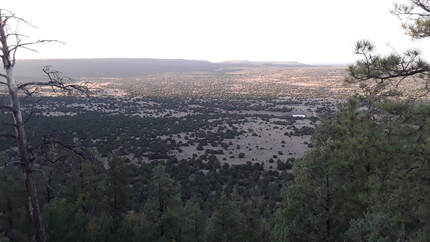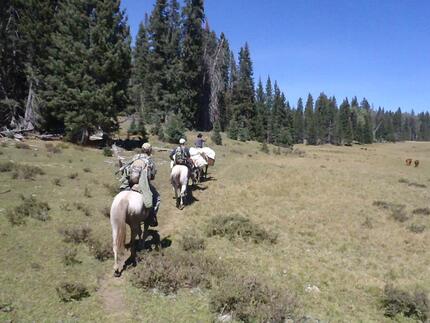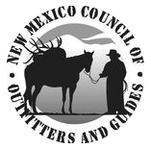NM ELK PRIVATE LAND USE SYSTEM (EPLUS)

The method that the New Mexico Department of Game and Fish (NMDGF) utilizes to reimburse landowners for the essential habitat and water resources they provide to wildlife on private property is called the Elk Private Land Use System (EPLUS). In most other states the Game and Fish agencies compensate landowners (for the costs associated with hosting wildlife on private land and for providing water to the state's wildlife) through direct monetary damage payments. NM's system is unique in that private landowners are allocated elk hunting permits which they can sell on the open market. This process allows the open market to offset the costs associated with wildlife on private property and allows the Dept. of Game and Fish to use their budget to further conservation projects rather than pay landowners for wildlife damages. EPLUS is a system which has taken the NMDGF decades to perfect and has established NM as a leader in private land wildlife conservation.

NMCOG understands the crucial importance of private landowners to the survival of NM's wildlife. Landowners in NM provide vast amounts of habitat and are a critical source of water in our arid landscapes. In some areas, private landowners provide the only water resource for many miles around. Landowners have spent generations, and millions of dollars, caring for New Mexico’s wildlife. They invest in habitat restoration projects, they leave water wells pumping even after the cattle are gone, they thin forested areas to promote grass growth, and they provide refuge for wildlife seeking to escape heavy pressure from public land hunters. Landowners should be reimbursed and incentivized for the essential conservation they provide to wildlife; and they are through EPLUS!
Hunting & fishing is the highest grossing outdoor recreation tourism industry in NM. The hunting/fishing industry is a billion dollar per year segment of NM Tourism. Representing the highest grossing Outdoor Recreation small businesses in the state. NM hunting and fishing outfitters operate on both public and private lands, frequently partnering with landowners to facilitate hunter/angler opportunity on lands that would otherwise not be accessible to sportsmen. All outfitters are business owners who pay NM Gross Receipts Taxes on all their trips and on every landowner permit. Outfitters provide jobs in very rural communities where unemployment is often at its highest. Outfitters additionally pay 3% of their gross income to the Forest Service and the Bureau of Land Management to operate commercially on federal lands.
EPLUS CONTINUES TO BE UNDER ATTACK!
The New Mexico Council of Outfitters and Guides has decided to contract with Southwick Associates to conduct a comprehensive economic study of the outfitting industry with a specific focus on the contribution of the Elk Private Land Use System (EPLUS) to New Mexico’s rural economies.
The NM Wildlife Federation and the NM Chapter of Backcountry Hunters & Anglers continue in their attempts to destroy the EPLUS program. These organizations try to bias the public perception of EPLUS through emotionally charged misinformation campaigns. Then they capitalize on the public’s confusion in order to manipulate state lawmakers.
Over the past 5 years NMCOG has been successful in combatting this attempt to dismantle the EPLUS program. However, these organizations have been relentless in their anti-EPLUS efforts, and it is getting harder for NMCOG to protect the program through advocacy alone. We need another tool in the toolbox. And we feel strongly that the tool needed is a reliable economic study conducted by a well-respected research firm. To save the EPLUS program it will be important for us to present lawmakers with economic data that they feel is reliable.
In prior years NMCOG has conducted in-house economic studies however, lawmakers and Dept. of Game and Fish leadership have been hesitant to take our numbers seriously because we failed to pay an accredited research firm to conduct the study. Southwick Associates is a well-known research firm based in Florida. They have conducted economic studies of the hunting & fishing industry across the US and Canada. They additionally produced the 2014 study of the NM hunting/fishing industry commissioned by the NM Dept. of Game and Fish. NMCOG is confident that an economic study produced by Southwick Associates will be well respected by government officials.
NMCOG feels strongly that this study is our best chance to ensure the long-term survival of the EPLUS program. But economic research of this magnitude is not cheap. The project will cost approximately $150,000. NMCOG is committed to delivering an economic study that will prove the importance of the outfitting industry and will emphasize the benefits of the EPLUS program to New Mexico’s economy. And we would really appreciate your help in funding this study. Any donation will be most appreciated, and no donation is too small!
The NM Wildlife Federation and the NM Chapter of Backcountry Hunters & Anglers continue in their attempts to destroy the EPLUS program. These organizations try to bias the public perception of EPLUS through emotionally charged misinformation campaigns. Then they capitalize on the public’s confusion in order to manipulate state lawmakers.
Over the past 5 years NMCOG has been successful in combatting this attempt to dismantle the EPLUS program. However, these organizations have been relentless in their anti-EPLUS efforts, and it is getting harder for NMCOG to protect the program through advocacy alone. We need another tool in the toolbox. And we feel strongly that the tool needed is a reliable economic study conducted by a well-respected research firm. To save the EPLUS program it will be important for us to present lawmakers with economic data that they feel is reliable.
In prior years NMCOG has conducted in-house economic studies however, lawmakers and Dept. of Game and Fish leadership have been hesitant to take our numbers seriously because we failed to pay an accredited research firm to conduct the study. Southwick Associates is a well-known research firm based in Florida. They have conducted economic studies of the hunting & fishing industry across the US and Canada. They additionally produced the 2014 study of the NM hunting/fishing industry commissioned by the NM Dept. of Game and Fish. NMCOG is confident that an economic study produced by Southwick Associates will be well respected by government officials.
NMCOG feels strongly that this study is our best chance to ensure the long-term survival of the EPLUS program. But economic research of this magnitude is not cheap. The project will cost approximately $150,000. NMCOG is committed to delivering an economic study that will prove the importance of the outfitting industry and will emphasize the benefits of the EPLUS program to New Mexico’s economy. And we would really appreciate your help in funding this study. Any donation will be most appreciated, and no donation is too small!
